In recent years, the convenience of at-home cooking has surged, and with it, the popularity of kitchen appliances like the Panini press has skyrocketed. As the culinary landscape evolves, the demand for unique and specialized kitchen gadgets has become a key factor in the market. One notable trend that has emerged is the rise of private label Panini presses, offering consumers a chance to own branded appliances with personalized touch. This article delves into the fascinating world of private label Panini presses, exploring their features, market dynamics, and the opportunities they present.
Introduction to Panini Press Market in Europe and America
In Europe and America, the panini press market has become a staple in households and commercial kitchens alike. These versatile countertop appliances have taken the sandwich-making experience to new heights, offering a delightful fusion of flavors and textures. The popularity of panini presses has surged, with consumers seeking out convenient and delicious ways to enjoy their favorite bread-based meals.
The market for panini presses in these regions is characterized by a diverse range of products, from simple, single-plate models to sophisticated multi-functional units. These devices have become a must-have for both the everyday home chef and the professional chef looking to enhance their menu offerings.
One of the key factors driving the growth of the panini press market is the increasing demand for fast and healthy meal options. As busy lifestyles become the norm, individuals are seeking out quick solutions for breakfast, lunch, and even dinner. Panini presses provide a solution that not only saves time but also allows for the creation of mouth-watering, custom sandwiches with a variety of ingredients.
In Europe, the panini press market is particularly vibrant. Countries like Italy, known for its culinary prowess, have embraced the panini as a staple on their menus. The traditional Italian panini, with its toasted bread and melted cheese, has become a beloved snack across the continent. European consumers are also drawn to the variety of options available, from the classic ham and cheese to the adventurous vegetarian combinations.
On the other side of the Atlantic, the American panini press market has its own unique characteristics. American consumers are known for their innovation and willingness to experiment with flavors. This has led to a plethora of panini variations, from classic American burgers to fusion sandwiches that blend international ingredients. The American market also sees a significant demand for gourmet and artisanal panini presses, which cater to those looking for high-quality appliances that complement their gourmet kitchen.
The rise of private label panini presses has been a significant development in this market. These branded products are produced by private label factories, which specialize in manufacturing items to be sold under another company’s name. This approach offers several advantages. For retailers and restaurateurs, private label panini presses provide a cost-effective way to introduce new products to their customers without the need for extensive research and development. For consumers, private label options often offer competitive pricing and unique features that differentiate them from more well-known brands.
Private label panini presses come in various designs, catering to different consumer preferences. Some models are compact and portable, ideal for travelers or those with limited kitchen space. Others are large and heavy-duty, designed to handle commercial use in cafes and delis. The variety of sizes and functionalities ensures that there is a private label panini press to suit every need.
In the European and American markets, the demand for private label panini presses is influenced by several factors. The emphasis on health and wellness has led to an increase in organic and natural panini press options. Additionally, the growing trend of food customization has created a market for private label presses that allow for a wide array of ingredients and toppings, ensuring that consumers can create the perfect sandwich to their liking.
As the panini press market continues to expand, the role of private label factories becomes even more crucial. These factories not only provide the necessary production capabilities but also offer expertise in design, marketing, and distribution. By working with private label factories, brands can enter the market quickly and efficiently, capitalizing on the current trends and consumer demands.
In conclusion, the panini press market in Europe and America is a dynamic and evolving sector, with a strong focus on innovation and convenience. The rise of private label panini presses has added another layer of competition and variety to the market, providing consumers with more options than ever before. As the demand for high-quality, customizable food options continues to grow, it’s clear that the panini press will remain a popular choice for years to come.
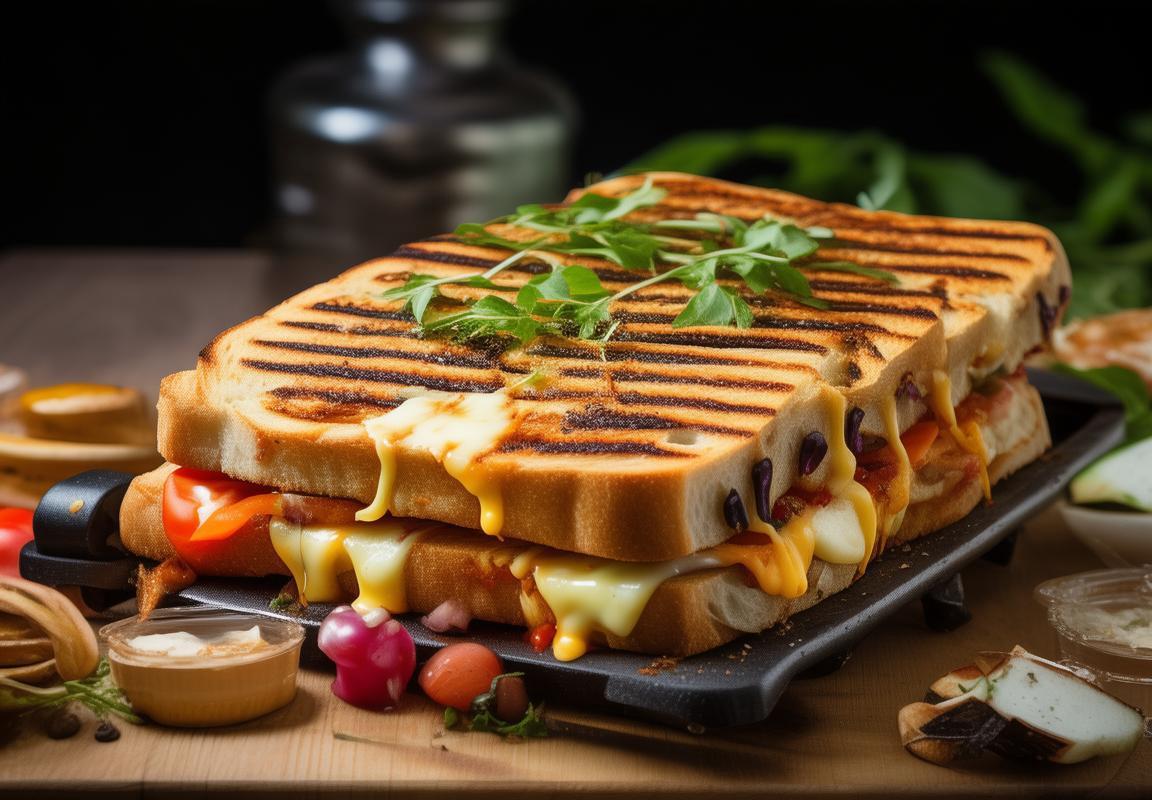
The Rise of Private Label Panini Presses
The private label panini press market has experienced a significant surge in popularity over recent years, transforming the way consumers approach their kitchen gadgets. This rise can be attributed to several factors that have reshaped the landscape of the European and American markets.
Consumers today are increasingly seeking unique and personalized products, and private label panini presses have stepped into this niche, offering a tailored experience that resonates with their desire for individuality. These specialized presses cater to a wide range of preferences, from the gourmet to the casual foodie, with models designed for various types of sandwiches, from classic ham and cheese to exotic fusion options.
The convenience factor cannot be overlooked. As busy lifestyles continue to dominate, the ease of using a panini press to create a delicious meal in mere minutes has become a major draw for consumers. Private label brands have capitalized on this by offering user-friendly designs that promise quick and effortless cooking, fitting seamlessly into the fast-paced routines of modern life.
Moreover, the affordability of private label panini presses has been a game-changer. While high-end brands may command a premium price, private label options provide the same quality at a fraction of the cost. This has democratized the market, making gourmet sandwiches more accessible to a broader audience without compromising on taste or performance.
Another driver of the rise in private label panini presses is the emphasis on health and wellness. Many consumers are looking for alternatives to fast food and processed snacks, opting instead for homemade meals that they can control. The versatility of panini presses allows for the creation of fresh, nutritious sandwiches, often with the added benefit of being able to incorporate whole grains and fresh vegetables into the mix.
In the European market, the culinary diversity and the prevalence of outdoor dining have also played a role in the popularity of private label panini presses. From the bustling streets of Paris to the beaches of Spain, the convenience of these presses for creating on-the-go snacks or a leisurely meal outdoors has made them a staple in many European homes.
Similarly, in the United States, the rise of food trucks and the casual dining scene has influenced the market. The portability and ease of use of private label panini presses make them perfect for food entrepreneurs and home chefs alike, who can use them to craft gourmet sandwiches for street fairs, festivals, or simply as a kitchen gadget to impress guests.
Additionally, the marketing strategies employed by private label brands have been clever and effective. Social media campaigns, influencer partnerships, and engaging content have helped to create buzz around these products, making them more than just kitchen appliances—they’ve become lifestyle accessories.
Private label panini presses have also benefited from the globalization of food trends. The increasing interest in international cuisines has spurred demand for presses that can handle a variety of fillings and cooking techniques, from Italian-style paninis to Japanese-style okonomiyaki.
As the market continues to grow, manufacturers and retailers are responding by offering a wider array of private label panini presses. From compact, single-plate models to multi-function presses that can also grill or toast, the options are expanding to meet the evolving needs of consumers.
In conclusion, the rise of private label panini presses in Europe and America is a testament to the changing demands of consumers. These presses have become a symbol of convenience, health, and personalization, all at an accessible price point. As the market continues to flourish, it’s clear that the private label panini press is here to stay, bringing a slice of culinary creativity to kitchens around the globe.
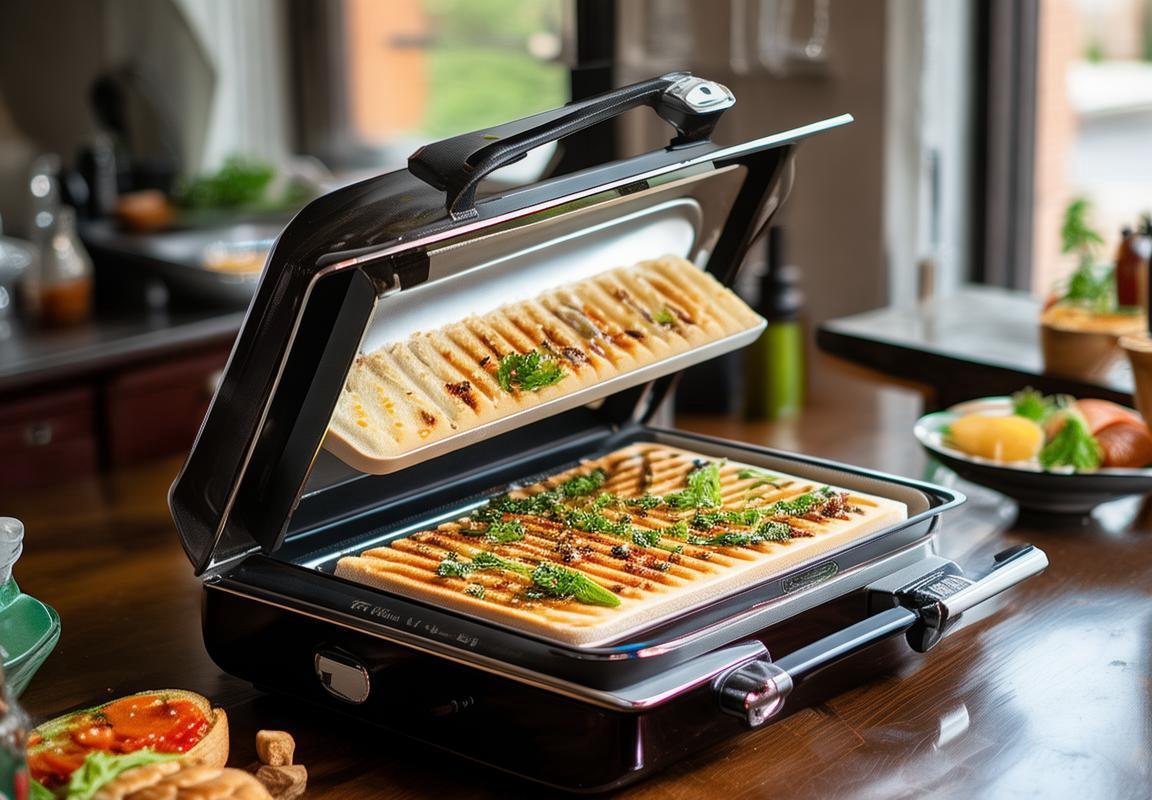
Key Features of Private Label Panini Presses
Private label Panini presses have gained significant traction in the kitchen appliance market, especially in Europe and America. These versatile devices have a variety of key features that set them apart and cater to the diverse needs of consumers. Here’s a closer look at some of the essential characteristics that make private label Panini presses a hit.
-
Non-Stick Coating: One of the most sought-after features in a Panini press is a non-stick coating on the cooking surface. This allows for easy release of the cooked food, minimizing the need for butter or oil, and simplifying the cleaning process after use.
-
Temperature Control: Accurate temperature control is crucial for achieving the perfect char and texture on a Panini. Private label models often come with adjustable temperature settings, enabling users to tailor the cooking process to their preferred level of crispiness and doneness.
-
Variable Press Pressure: A consistent press is essential for even cooking and achieving those signature grill marks on a Panini. Many private label presses are designed with a variable pressure system, ensuring that the pressure can be adjusted according to the thickness of the ingredients being cooked.
-
Large Cooking Surface: A spacious cooking surface is a must for preparing large batches of Panini or for accommodating larger sandwiches. Private label models often feature generous cooking areas, which can handle multiple sandwiches at once.
-
Removable Plates: For ease of cleaning and storage, many private label Panini presses are equipped with removable plates. This feature not only makes cleaning simpler but also allows for easy disassembly and cleaning of the appliance.
-
Safety Lock: A safety lock is a critical feature that prevents accidental pressing or opening of the press while it’s in use. This is especially important for households with children or for those who might be clumsy when handling hot appliances.
-
Built-in Thermostat: A built-in thermostat ensures that the Panini press maintains a steady and consistent temperature throughout the cooking process. This is particularly beneficial for users who prefer a precise cooking experience.
-
Heat Indicator: A heat indicator light or signal is a convenient feature that lets users know when the press is ready for cooking. This eliminates the guesswork and ensures that the food is cooked at the optimal temperature.
-
Easy-to-Clean Design: The design of a private label Panini press is often thoughtfully crafted with ease of cleaning in mind. Features like a smooth surface, non-porous materials, and detachable components make the cleaning process more efficient.
-
Multiple Cooking Functions: Some private label models offer additional cooking functions beyond Panini sandwiches, such as grilling, flipping, and even baking. This versatility allows users to get more out of their Panini press and use it for a wider range of recipes.
-
Energy Efficiency: As environmental consciousness grows, energy efficiency has become a key factor in appliance purchases. Many private label Panini presses are designed to be energy-efficient, reducing energy consumption and costs over time.
-
Portability: For those who enjoy outdoor cooking or have limited counter space, portability is a significant feature. Some private label presses are lightweight and compact, making them easy to transport and store.
-
Warranty and Customer Service: A reliable warranty and good customer service are also important aspects of private label Panini presses. Brands that offer peace of mind with their products tend to build trust and loyalty among consumers.
These key features not only enhance the cooking experience but also contribute to the appeal of private label Panini presses. As consumers continue to seek out high-quality, functional kitchen appliances, these features are likely to remain at the forefront of what makes a Panini press stand out in the competitive market.
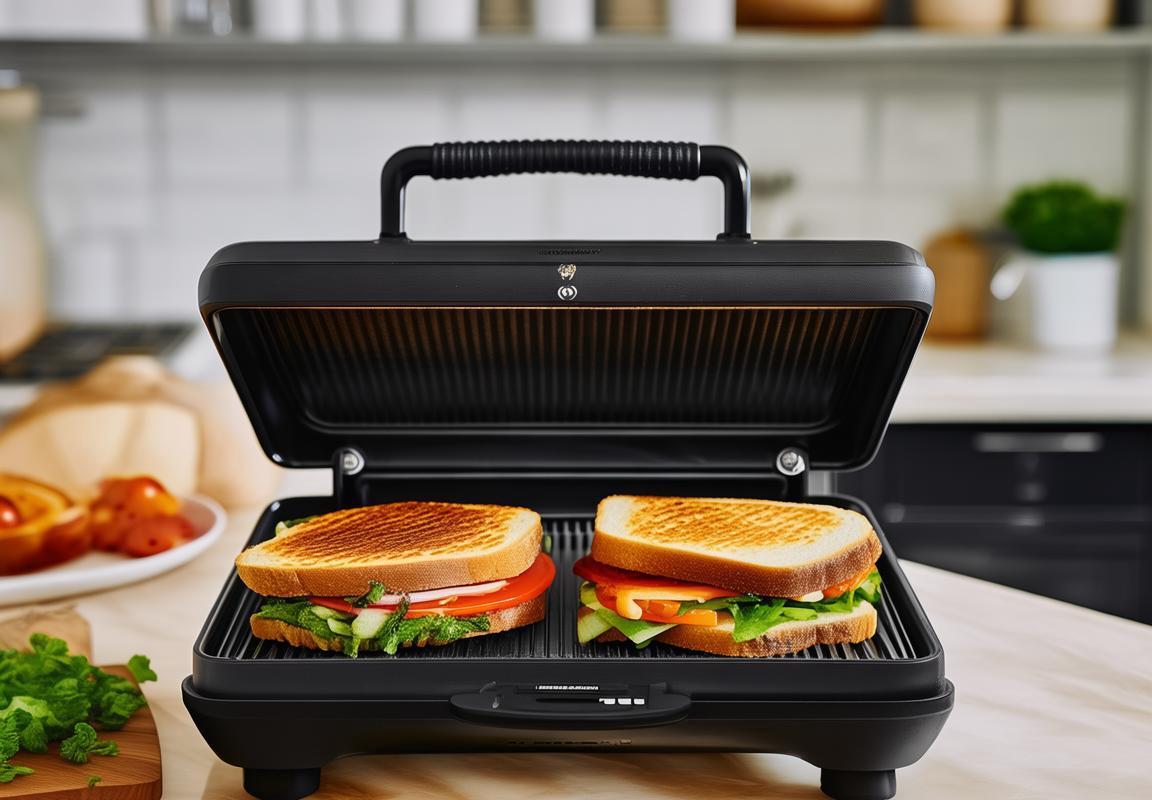
Market Dynamics in Europe and America
In the competitive landscape of the European and American kitchen appliance markets, private label Panini presses have emerged as a significant force. These compact, versatile devices have captured the interest of consumers with their unique set of features that cater to various preferences and needs. Let’s delve into some of the key features that make private label Panini presses stand out.
-
Compact and Portable DesignPrivate label Panini presses are often designed with portability in mind. They feature a compact size that makes them easy to store and transport. This is particularly appealing to those with limited kitchen space or frequent travelers who want to enjoy a homemade Panini on the go.
-
Versatility in Cooking OptionsWhile originally designed for making Paninis, many private label models now offer a range of cooking functions. These include grilling sandwiches, sealing wraps, and even making wraps or other handheld snacks. The versatility allows users to get more value from their appliance.
-
Non-Stick CoatingA non-stick coating is a standard feature in most private label Panini presses. This not only makes it easier to clean but also ensures that the food does not stick to the press, maintaining the quality and integrity of the sandwich.
-
Adjustable Heat SettingsTo cater to different preferences, many private label models come with adjustable heat settings. Users can choose the level of heat that suits their liking, whether they prefer their sandwiches to be perfectly toasted or well-done.
-
Indicator LightsFor ease of use, most private label Panini presses are equipped with indicator lights. These lights signal when the press is preheated and ready for use, reducing the guesswork for the user.
-
Safety FeaturesSafety is a top priority in kitchen appliances, and private label Panini presses are no exception. Features like automatic shut-off after a certain period of inactivity or when the press is left open help prevent overheating and potential accidents.
-
Different Press StylesPrivate label Panini presses come in various press styles, from the classic flat press that seals sandwiches to models with a dome shape that can also cook other foods like eggs or pizza. This variety allows consumers to choose the style that best suits their cooking preferences.
-
Easy to CleanMaintaining a private label Panini press is a breeze due to its design and materials. Many models are made with removable parts and non-stick coatings, making cleaning a quick and straightforward process.
-
Budget-Friendly PricingOne of the most attractive aspects of private label Panini presses is their affordability. These appliances often come at a lower price point compared to branded counterparts, making them accessible to a wider consumer base.
-
Brand CustomizationPrivate label brands offer the opportunity for customization, allowing retailers and businesses to create their own unique line of Panini presses. This can include branding, color options, and even specific features that align with their target market.
As the market for private label Panini presses continues to grow, these features play a crucial role in attracting customers. The ability to provide a quality product at a competitive price, with the added benefit of customization, has made private label Panini presses a popular choice for both consumers and businesses alike.
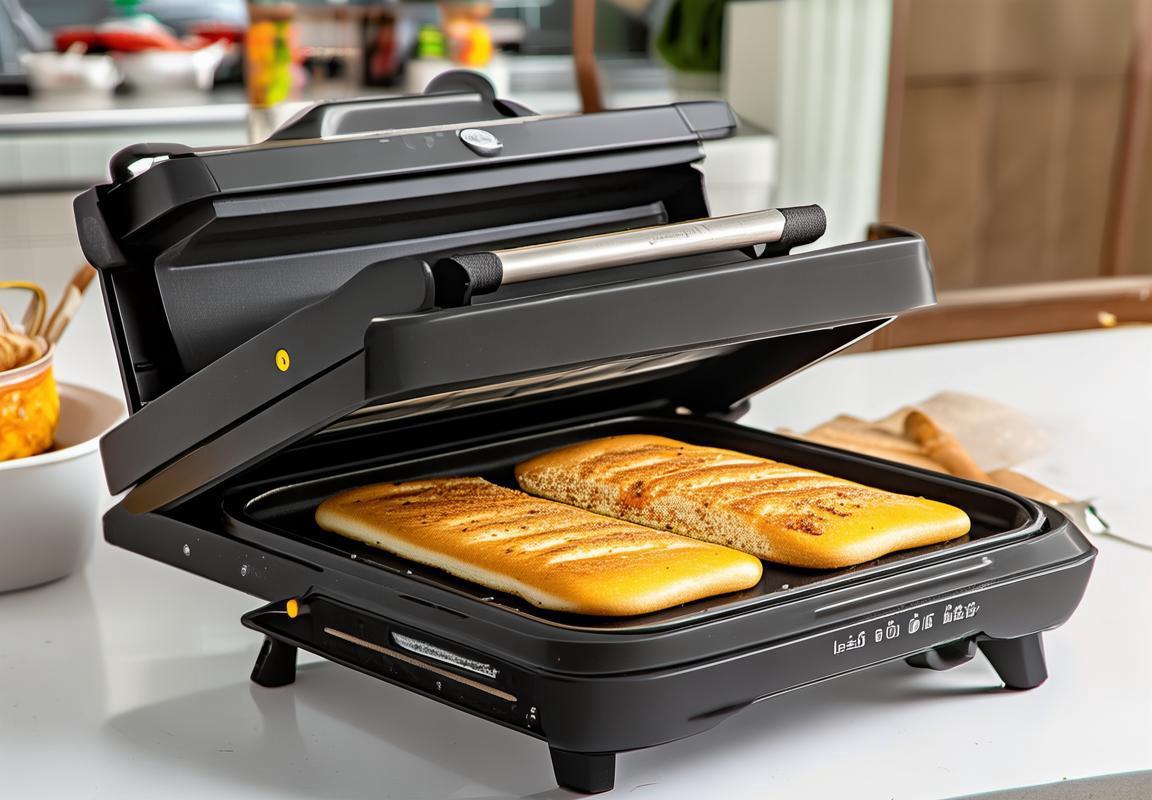
The Role of Private Label Factories
In the bustling landscape of the kitchen appliance industry, private label factories have emerged as pivotal players, shaping the market dynamics with their specialized services. These factories, often unnoticed by the end consumer, play a crucial role in the production of private label Panini presses, contributing significantly to their rise in popularity.
Private label factories are the backbone of the industry, offering a range of services that cater to the unique needs of brands looking to establish their presence in the competitive European and American markets. From design and engineering to mass production and quality control, these factories provide a comprehensive solution that allows brands to focus on marketing and sales strategies.
Design and Customization ExpertiseOne of the key roles of private label factories is to offer design and customization services. They work closely with brands to understand their vision and translate it into a tangible product. This includes creating custom molds for unique shapes and sizes, incorporating brand logos, and ensuring that the design aligns with the target market’s aesthetic preferences. The ability to offer such personalization is a major draw for brands looking to differentiate themselves in a crowded market.
Quality Control and Manufacturing EfficiencyPrivate label factories are known for their stringent quality control processes. They adhere to international standards and employ advanced manufacturing techniques to ensure that every Panini press that rolls off the assembly line meets the highest quality benchmarks. This efficiency not only guarantees customer satisfaction but also reduces production costs for the brands, making private label products more competitive in the market.
Supply Chain ManagementThe logistics of supply chain management are a critical aspect of the private label factory’s role. These factories have established networks that can source materials globally, ensuring a steady supply of high-quality components. Their expertise in managing inventory, production schedules, and shipping logistics allows brands to maintain a consistent product availability without the burden of managing these complex operations themselves.
Sustainability and ComplianceWith increasing environmental concerns, private label factories have taken on the responsibility of ensuring that their production processes are sustainable. They use eco-friendly materials, minimize waste, and implement energy-efficient practices. Additionally, these factories are well-versed in compliance with various regulations, including safety standards, certifications, and labeling requirements, which are essential for brands to operate smoothly in both Europe and America.
Cost-Effective ProductionCost-effectiveness is a cornerstone of private label factories. They leverage economies of scale to produce Panini presses at competitive prices. By centralizing production, these factories can optimize their resources and pass on the savings to the brands. This cost advantage allows smaller brands to enter the market without the high initial investment typically associated with setting up a manufacturing facility.
Flexibility and ScalabilityBrands often require the ability to scale up or down quickly in response to market demands. Private label factories are equipped to handle varying production volumes, from small batches for niche markets to large-scale orders for mass distribution. This flexibility ensures that brands can adapt to changing market trends without interrupting their supply chain.
Innovation and R&DStaying ahead in the market requires constant innovation. Private label factories often have dedicated research and development teams that work on new technologies and product improvements. This collaboration with brands can lead to the development of cutting-edge Panini presses that incorporate the latest features and functionalities, keeping the brands competitive.
Custom Packaging and Branding SolutionsBranding is everything in the consumer market, and private label factories understand this well. They offer branding solutions that go beyond just the product itself, including custom packaging design and labeling. This complete branding package helps brands create a cohesive and memorable brand identity.
In conclusion, private label factories are the unsung heroes of the kitchen appliance industry, particularly in the realm of Panini presses. Their multifaceted role in design, quality control, supply chain management, sustainability, cost-effectiveness, flexibility, innovation, and branding solutions makes them indispensable partners for brands aiming to establish a strong presence in the dynamic European and American markets.

Case Studies: Successful Private Label Panini Press Brands
In the bustling world of kitchen appliances, private label Panini presses have emerged as a standout category. Let’s delve into the success stories of a few brands that have made a mark in this niche market.
-
Brand A: From Local Favourite to Global PlayerBrand A started as a small, family-owned business in a quaint European town. Their initial focus was on creating high-quality Panini presses for local cafes and restaurants. However, as the demand grew, so did their ambition. By investing in research and development, they expanded their product line and began to cater to a broader market. Today, Brand A’s private label presses are sought after by gourmet chefs and home cooks worldwide.
-
Brand B: Leveraging Innovation for Market DominanceRecognizing the importance of innovation, Brand B took a different approach. They developed a unique design that allowed for even heat distribution and quicker cooking times. This innovation caught the attention of several retail chains, leading to a surge in their private label sales. The brand’s commitment to quality and cutting-edge technology has solidified its position as a leader in the Panini press market.
-
Brand C: Niche Targeting and Unique Selling PropositionsBrand C discovered that the key to their success lay in targeting specific market niches. They focused on eco-friendly materials and energy-efficient designs, appealing to environmentally conscious consumers. By highlighting their unique selling propositions, such as the use of recycled materials and energy-saving features, Brand C was able to carve out a niche for themselves in the private label market.
-
Brand D: Strategic Partnerships and Brand ExpansionBrand D’s growth strategy involved forming strategic partnerships with established kitchen appliance brands. By leveraging these relationships, they were able to access a wider distribution network and gain credibility. This move not only increased their market share but also opened up new opportunities for expansion into international markets.
-
Brand E: Embracing Digital Marketing and Social MediaBrand E recognized the power of digital marketing and social media in reaching their target audience. By creating engaging content, they were able to build a strong online presence and drive traffic to their website. Their effective use of social media advertising and influencer partnerships helped them gain traction in the private label market, leading to increased sales and brand recognition.
-
Brand F: Diverse Product Range and Customization OptionsBrand F’s success can be attributed to their diverse product range and customization options. They offer a variety of Panini presses, including compact models for small kitchens and large commercial presses for busy cafes. Additionally, they provide custom branding services, allowing retailers to create unique products that resonate with their customers. This approach has made Brand F a preferred choice for private label manufacturers looking to offer a tailored product to their customers.
-
Brand G: Customer-Centric Approach and Continuous ImprovementBrand G has always believed in putting their customers first. They invest heavily in customer feedback and use this information to continuously improve their products. This customer-centric approach has earned them a loyal following and positive reviews, making them a go-to brand for private label Panini presses.
-
Brand H: Embracing Sustainability and Ethical ManufacturingIn a world increasingly aware of sustainability, Brand H has capitalized on this trend. They focus on using sustainable materials and employ ethical manufacturing practices. This commitment to the environment and their workers has not only helped them gain a strong market presence but has also positioned them as a responsible brand in the private label Panini press industry.
By examining these case studies, it’s clear that successful private label Panini press brands have a combination of innovative products, strategic partnerships, and a deep understanding of their target market. Their ability to adapt to changing consumer needs and trends has propelled them to the forefront of this competitive market.
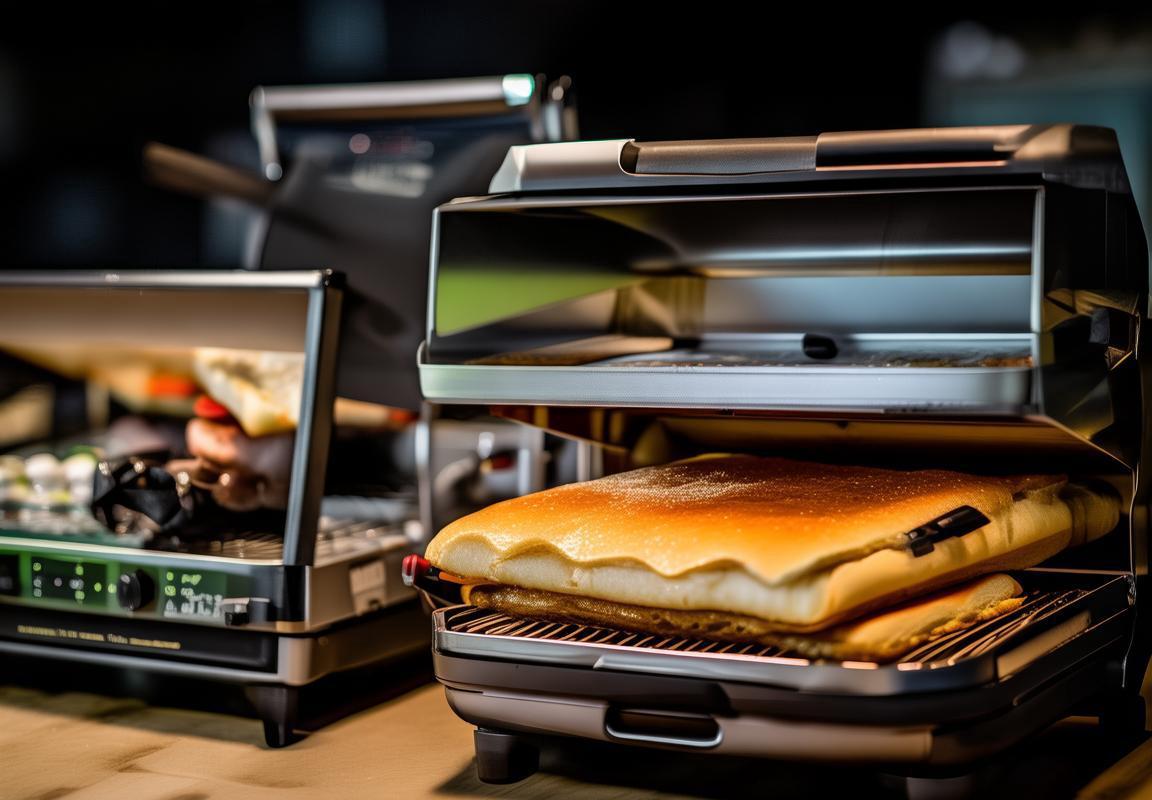
Challenges and Opportunities in the Private Label Panini Press Industry
In the world of private label panini presses, challenges and opportunities often go hand in hand. Navigating the complexities of market demands, consumer trends, and production logistics can be daunting, but it also presents unique chances for growth and innovation.
The competition for market share in the private label panini press industry is fierce. Brands must constantly innovate to stay ahead, which means investing in new technologies and design elements that appeal to a broad consumer base. However, this also means that the cost of production can increase, posing a challenge for manufacturers looking to maintain competitive pricing.
On the other side of the coin, there’s a significant opportunity in the rise of health-conscious consumers. As more people seek out healthier alternatives to fast food, the demand for high-quality, at-home panini presses has surged. This shift in consumer preference opens doors for private label brands to offer gourmet, healthier options that cater to this niche market.
Another challenge lies in the distribution channel. Retailers are increasingly looking for unique and exclusive products to differentiate their stores from competitors. Private label brands must navigate this landscape by offering something that stands out, which can be a delicate balance between originality and the need to appeal to a wide audience.
In contrast, the opportunity here is to establish strong relationships with retailers. By providing them with exclusive products that align with their brand identity and customer demographics, private label manufacturers can secure long-term partnerships. This exclusivity can translate into higher profit margins and a more stable market presence.
The quality control process is another area where private label brands often face challenges. Ensuring that every panini press meets the same high standards can be difficult, especially as production scales up. However, this also presents an opportunity to streamline operations and invest in quality assurance protocols that can be a selling point for the brand.
Manufacturers that invest in rigorous quality control can highlight their commitment to excellence, which can be a significant draw for consumers who are willing to pay a premium for reliability. This focus on quality can also lead to a loyal customer base, as satisfied customers are more likely to recommend the product to others.
Innovation is a double-edged sword in the private label panini press industry. On one hand, it’s essential to keep up with the latest trends, such as the integration of smart technology or eco-friendly materials. On the other hand, it can be challenging to balance innovation with the need to keep production costs in check.
The opportunity here is to find that sweet spot where innovation meets affordability. By adopting cost-effective manufacturing techniques and sourcing materials that are both innovative and budget-friendly, private label brands can offer cutting-edge products without breaking the bank.
Lastly, the global nature of the private label panini press market presents both challenges and opportunities. Exporting products requires a deep understanding of international regulations, cultural preferences, and shipping logistics. However, this also means that there’s a vast global market to tap into, with consumers in different regions looking for unique and quality panini presses.
To capitalize on this opportunity, private label brands must conduct thorough market research to understand the specific needs and preferences of each target market. This can involve adapting product features, packaging, and marketing strategies to align with local tastes and regulations.
In summary, the private label panini press industry is filled with challenges that require careful consideration and strategic planning. However, with a keen eye for consumer trends, a commitment to quality, and a willingness to innovate within budgetary constraints, these challenges can be transformed into significant opportunities for growth and success.

The Future of Private Label Panini Presses
The private label panini press industry is undergoing a transformation, and it’s clear that the future holds a blend of challenges and opportunities. Here’s a glimpse into what lies ahead:
Innovation in Design and TechnologyAs consumer preferences evolve, there’s a growing expectation for advanced features in panini presses. Smart technology, such as touch screen interfaces and programmable settings, is likely to become more common, offering users a customizable cooking experience. The future may also see the integration of apps that allow for remote control and recipe suggestions, enhancing the overall convenience.
Sustainability and Eco-Friendly PracticesWith environmental concerns at the forefront, the private label panini press industry is expected to embrace more sustainable manufacturing processes. This could include the use of recycled materials, energy-efficient designs, and a commitment to reducing carbon footprints. Brands that prioritize eco-friendly practices are likely to appeal to environmentally conscious consumers.
Global Market ExpansionThe demand for private label panini presses is not limited to Europe and America. As travel and cultural exchange continue to bridge gaps between countries, the market for these appliances is poised to expand globally. Understanding and adapting to local tastes and cooking styles will be crucial for brands looking to tap into new international markets.
Customization and PersonalizationThe future may bring a shift towards highly customized and personalized panini presses. Private label factories could offer a range of options for branding, from color schemes and logos to unique features that cater to niche markets. This could lead to a surge in co-branded appliances, where brands collaborate with manufacturers to create exclusive products.
Increased Focus on Health and WellnessThe health and wellness trend is unlikely to wane, and this could influence the design and marketing of private label panini presses. Features that promote healthy cooking, such as non-stick coatings and temperature controls, are likely to be emphasized. Additionally, there may be a rise in models that allow for the preparation of nutritious, home-cooked meals that are convenient and low in calories.
Emerging Trends in the KitchenThe kitchen is no longer just a place for cooking but a hub for social activities. The future of private label panini presses could include models that not only prepare food but also serve as part of the kitchen decor. Designs may become more aesthetic and adaptable to different kitchen settings, appealing to homeowners who value both form and function.
Integration with Smart Home SystemsThe integration of panini presses with smart home systems is a possibility that could change the way we interact with these appliances. Imagine being able to remotely control your panini press while at work or on the go, or having it automatically adjust settings based on your dietary preferences. This level of connectivity could become a standard feature in the next generation of panini presses.
Marketing and Branding EvolutionBranding will play a significant role in the future of private label panini presses. As consumers become more discerning, the way brands communicate their values and benefits will need to evolve. Storytelling, social media influence, and eco-friendly initiatives are likely to be key strategies in building brand loyalty and trust.
Legal and Regulatory ComplianceThe future will demand strict adherence to legal and regulatory standards, especially as it pertains to safety and health. Private label factories will need to ensure that their products meet stringent guidelines to avoid recalls and maintain a good reputation.
Economic Fluctuations and Supply Chain ManagementEconomic changes can impact the private label panini press industry. Fluctuations in the cost of materials and the complexity of supply chains will require agility and resilience from manufacturers. Diversifying suppliers and maintaining flexible production capabilities will be crucial in navigating these challenges.
In conclusion, the future of private label panini presses is shaped by a variety of factors, including technological advancements, consumer trends, and the evolving landscape of global markets. Adapting to these changes will be essential for brands and manufacturers to remain competitive and innovative.
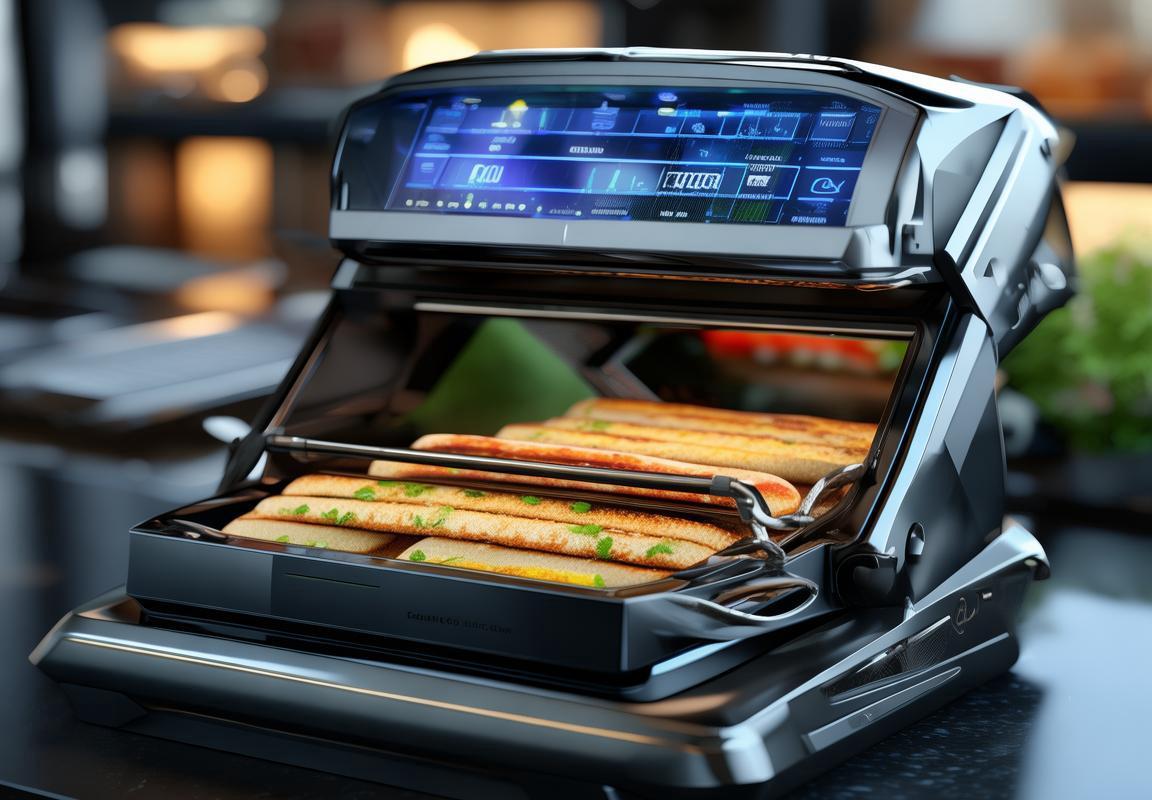
Conclusion
In the ever-evolving landscape of the kitchen appliance industry, the rise of private label panini presses has sparked a wave of innovation and consumer interest. These compact, versatile devices have found their way into homes across Europe and America, offering a convenient way to savor delicious sandwiches at the comfort of one’s kitchen. As we reflect on the journey of private label panini presses, it’s clear that the industry has faced its fair share of challenges and opportunities, shaping the future of these popular appliances. Let’s delve into the insights gained from successful private label panini press brands and the potential paths forward for this niche market.